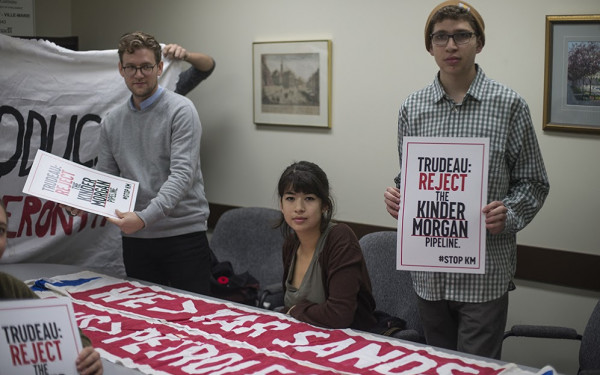Boots Riley Talks Optimism, Occupy and Revolution
With an immaculate afro and razor-sharp sideburns, Boots Riley looks like a Black Panther frozen in time, or a long-lost member of Sly and the Family Stone. But the lifelong activist and musician’s politics are only looking forward, ever searching for the path to revolution.
Boots, born Raymond Riley, is coming to Concordia Feb. 11 as the latest in the Concordia Student Union’s speaker series, this month presented in collaboration with the Concordia Caribbean Student Union and Students of History at Concordia.
Riley’s music is best known from his Oakland-based hip-hop group The Coup, which has been active since the early ‘90s, and more recent work with Rage Against the Machine’s Tom Morello in the Street Sweeper Social Club.
From the MTV crowd to the underground rap show, Boots does it all. After all, he got into music to reach out to as many people as possible.
“Some of what’s informing the revolutionary aesthetic is a punk aesthetic. A punk aesthetic has to do with being rebellious against any number of people, but a punk aesthetic is not one with the aim of creating a revolution of touching the people that are not yet won over,” said Riley.
“This is not about being underground, this is about being above ground. That’s what drives my whole artistic being; it’s what drives who I am.”
Growing up with a father who belonged to the radical communist Union Labor Party, Riley had early insight into class struggles and a distaste for the current economic system. No matter the topic of his rhymes, he says that class dynamics are always present.
“If you don’t have a class analysis [in protest music] that says this world is run by the exploitation of the working class’ labour by the ruling class, then you’re going to come up with all this other mystical shit of why things are fucked up,” said Riley.
“And what you’re going to have is something angry and frustrating.”
He criticizes protest art that only looks inward, saying that you can change inside all you want—but that you’ll only get angrier when the world doesn’t follow suit.
This perspective, he says, comes more from his experience as an organizer than being a musician. What Riley preaches instead is optimism, and he says that his message is one that helps people realize their economic power.
“The problems and possibilities are the same in almost every demographic of people in the world. One is they wish the world was different. Two is most of us think we have no power to affect change in the world. I don’t think that students are more optimistic than most people,” said Riley, who speaks at campuses multiple times a year.
“I think sometimes they are in a material position where they have less to risk than someone who has to feed five kids. But I think they still suffer from the same pessimism.”
He says people need to be reminded that they can change things, not just that things are bad—that people just need to see that there exists winnable battles over material change such as wages, housing and education.
“Often we are told the system is evil, which it is, but in this conspiracy sort of way where there are five people in a room that control the world and there’s nothing you can do about it,” said Riley. “I think that optimism grows when there’s a movement, when people are fighting for material things together.”
Riley was a prominent face of Occupy Oakland, where he’s lived most his life. It’s this lack of constructive mentality that led the movement to break down.
“Nobody was meeting and saying, ‘How do we work with people and talk about these ideas?’” said Riley. “Some of that I can relate to an anarchist [perspective], trying to develop someone politically is tantamount to being an imperialist.”
But that idea leaves groups only organizing with people who already agree with you, he says, creating “affinity groups” instead of community groups.
“The unfortunate thing is that the new folks come in with the possibility of becoming more radicalized, but a lot of them were just shunned and went home,” said Riley.
“I think organizers have a duty to know a lot of people. To be friendly, to make conversation wherever you are and to not have most of your friends be other organizers. If most of your friends are organizers, you’re not going to grow.”
He argues that no successful social movement was made by creating a new group of people, that organizing has to be where you work, where you study—that it needs to be more than something extra-curricular.
“If you consider yourself radical that means you want to build a revolutionary movement, and building a revolutionary movement can’t be made by forging an insular culture,” said Riley.
Boots Riley is speaking in the CSU lounge on the seventh floor of the Hall Building on Feb. 11, from 7 p.m. to 9 p.m. Admission is free for students, and $5 for non-students.

_900_586_90.jpg)


2_600_375_90_s_c1.jpg)

2_600_375_90_s_c1.jpg)
_600_375_90_s_c1.jpg)